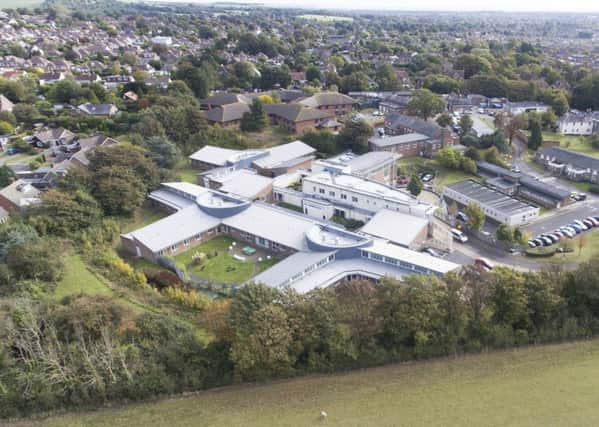Worthing teen's mental health led her to self harm at Meadowfield Hospital, inquest finds


Morghana Woodburn was pronounced dead in her bedroom at Meadowfield Hospital in Arundel Road, Worthing, at 5.43pm on Tuesday, January 9.
A inquest into her death was opened at Crawley Coroners Court on Monday (November 5).
Advertisement
Hide AdAdvertisement
Hide AdToday, the jury found the cause of death to be compression of the neck, while noting Morghana’s diagnosis of emerging emotionally unstable personality disorder and post-traumatic stress disorder.
The court had previously heard that Morghana had been in the care system for several years when she was admitted to hospital following a suicide attempt in May 2017.
She remained in various hospitals, either sectioned or as a voluntary patient, until her death.
Her older sister, Amberley Woodburn, described her as ‘loving person’ and a ‘wonderful sister’, who had good days and bad days and was trying to get better.
Advertisement
Hide AdAdvertisement
Hide AdHer social worker, David Christie Davis, said Morghana had a ‘great sense of humour’ and loved horse riding and baking cakes.
At the inquest today, Penelope Schofield, senior coroner for West Sussex, gave a summary of the evidence heard over the last two days.
She said Morghana was moved seven times between four different hospitals over the nine months leading up to her death.
The court had heard from Zoe Greatorex, charge nurse, that Morghana was moved between acute and intensive wards and that these moves were necessary due to the deterioration in her mental health.
Advertisement
Hide AdAdvertisement
Hide AdSarah Godfrey, Morghana’s personal adviser from the leaving care team at West Sussex County Council, said Morghana was ‘extremely keen’ to plan for her accommodation for when she was well enough to leave the hospital and was ‘desperate’ for somewhere to call home.
But Ms Godfrey said planning ahead was ‘extremely difficult’ because the adult mental health team required her to have had a period of stability before plans could be made about where she would go.
At no point in her stay did she present stability and at no point was leaving a possibility, Ms Schofield said.
Morghana was admitted to the Maple ward at Meadowfield Hospital on December 19.
Advertisement
Hide AdAdvertisement
Hide AdDr Anthony Ahwe, consultant psychiatrist at Meadowfield Hospital, said Morghana, who experienced distressing pseudo hallucinations and dissociation, was put on general observations, meaning she was checked on hourly.
He believed these were appropriate as he had noticed a pattern of behaviour which showed that reducing Morghana’s liberty would increase her risk, the court heard.
However charge nurse Katherine Page said staff would check on her more regularly if she was found to be isolating herself or low in mood.
Luke Myatt, manager on Maple ward at Meadowfield Hospital, said Morghana had told her that having her personal items removed and being under constant watch made her feel frustrated.
Advertisement
Hide AdAdvertisement
Hide AdMr Myatt said that he wanted everyone involved with Morghana’s care to sit down together and make a long-term plan for her. There were differing views as to the best approach and he felt a professional meeting needed to be arranged to discuss a plan, the court heard.
The meeting had been scheduled to take place the day after Morghana’s death.
Nathan Rye, a community mental health advocate for MIND, who had been working with Morghana for about six weeks before her death, said Morghana had ‘real concerns’ about what her next placement would be and was ‘very worried’ she would not be discharged from hospital.
On the day of her death, Mr Rye met with Morghana said she ‘appeared OK’ and ‘quite positive about her future’.
Advertisement
Hide AdAdvertisement
Hide AdLater that day, Paul Mclean, nursing assistant, said he heard ‘unusual noises’ including ‘banging’ and ‘ripping’ noises from her room.
He said he went to ask her if she was OK and she nodded but did not make eye contact. He did not see anything out of order in her room, the court heard.
Later she came into the social room and asked to borrow a pen from Mr Mclean. He said she made eye contact and smiled at him, and later returned the pen.
When Ms Greatorix carried out observations at around 4pm, she found Morghana on the floor of her room and raised the alarm.
Advertisement
Hide AdAdvertisement
Hide AdA number of staff responded and CPR was started. The ambulance service arrived and worked on Morghana for nearly an hour, but she was pronounced dead at 5.43pm.
Delivering their conclusion, the jury said that at the time of her death Morghana was being checked on hourly by staff and said ‘this was appropriate for her current risk level’.
On that day, Morghana did not present with features that heightened her risk level, the jury found.
The emergency help response offered ‘was appropriate’, commencing CPR and calling paramedics, the jury said.
Advertisement
Hide AdAdvertisement
Hide AdThe jury concluded her death was a result of her mental health diagnosis which led her to self harm.
If you are affected by any issues raised in this story, contact The Samaritans for confidential support on 116 123.
